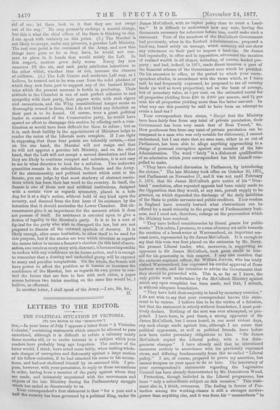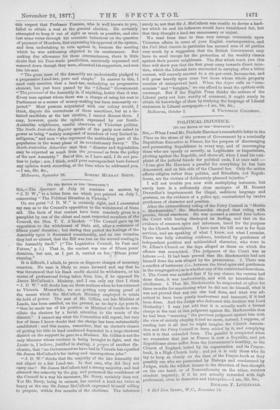LETTERS TO THE EDITOR.
THE POLITICAL SITUATION IN VICTORIA. To THE EDITOR OF THE SPECTATOR.") SM,—In your issue of July 7 appears a letter from "A Victorian Colonist," containing statements which cannot be allowed to pass unnoticed, although it is difficult to refute a calumny nearly three months old, or to excite interest in a subject which your readers have probably long ago forgotten. The author of the letter would, I think, have acted more fairly, when making whole- sale charges of corruption and dishonesty against a large section of his fellow-colonists, if he had attached his name to his accusa- tions, and had not sheltered himself by an assumed title. I pro- pose, however, with your permission, to reply to these accusations in order, having been a member of the party against whom they are made, and intimately acquainted with the movements and objects of the late Ministry during the Parliamentary struggle which has ended so disastrously to us. Your correspondent's first statement is that "for a year and a half the country has been governed by a political Ring, under Sir James McCulloch, with no higher policy than to avert a Land- tax." It is difficult to understand how any man, having the documents necessary for reference before him, could make such a statement. Four of the members of the McCulloch Government had previously, when in the Kerferd Administration, proposed a land-tax, based solely on acreage, which certainly did not show any reluctance on their part to impose a land-tax. Sir James. had repeatedly, in office and in opposition, advocated the taxatioa of realised wealth in all shapes, including, of course, landed pro- perty ; and had, indeed, in 1871, made direct taxation a part of the financial scheme of the Government over which he presided.. On his accession to office, at the period to which your corre- spondent alludes, in accordance with the views which, as I have said, he had frequently expressed, he proposed to tax all country. lands (as well as town properties), not on the basis of acreage, but of monetary value, at 5 per cent, on the estimated rental for all properties yielding from 2.80 to 2200 per annum, and 7k per cent, for all properties yielding more than the latter amount. In what way can this possibly be said to have been an attempt to. evade a land-tax ?
Your correspondent then states, "Except that the Ministry have been fairly free from any taint of private peculation, their Government has been very much that of Boss Tweed," &c. How gentlemen free from any taint of private peculation can be- compared to a man who was only notable for dishonesty, I cannot understand, but I can state that no sane man, either in or out of Parliament, has been able to allege anything approaching to a charge of personal corruption against any member of the late Administration. The word " fairly " is a dishonest qualification of an admission which your correspondent has felt himself com- pelled to make.
"They have checked discussion in Parliament, by introducing the cloture." The late Ministry took office on October 20, 1875,, met Parliament on November 17, and it was not until February 2, 1876, that Sir James McCulloch gave notice of his " Iron- hand " resolution, after repeated appeals had been vainly made to. the Opposition that they would, at any rate, permit supply to be' granted, on which depended the discharge of the daily liabilities. of the State to public servants and public creditors. Your readers. in England have recently learned what obstructions can be- offered by a small minority to the progress of Parliamentary busi- ness, and I need not, therefore, enlarge on the provocation which. the Ministry here received.
"They have bribed constituencies by liberal grants for public
works." This refers, I presume, to a sum of money set aside towards. the erection of a breakwater at Warrnambool, an important sea- coast town, represented by Sir James McCulloch. It is enough to say that this vote was first placed on the estimates by Mr. Berry, the present Liberal leader, who, moreover, in supporting an opponent to Sir James McCulloch, took great credit to him- self for his generosity in this respect. I may also mention that the eminent engineer officer, Sir William Jervois, who has lately visited Warrnambool, has expressed his cordial approval of these harbour works, and his intention to advise the Government that they should be proceeded with. This is, so far as I know, the- only public work undertaken by the McCulloch Ministry against which any open complaint has been made, and that, I submit,. is without adequate foundation.
"They have held their majority in hand by monetary coercion." I do not wish to say that your correspondent knows this state- ment to be untrue. I believe him to be the victim of a delusion, but that the statement is utterly without foundation, I most posi- tively declare. Nothing of the sort was ever attempted, or pro- jected. I have been, in past times, a strong opponent of Sir James McCulloch, but I never heard, in our most violent days, any such charge made against him, although I am aware that political opponents, as well as political friends, have before now been under pecuniary obligations to him. "Sir James. McCulloch copied the Liberal policy, with a few disin- genuous changes." I have already said that he introduced' measures entirely in accordance with his previously expressed, views, and differing fundamentally from the so-called "Liberal policy." I am, of course, prepared to prove my assertion, but cannot trespass on your space to do so here. The inaccuracy of your correspondent's statements regarding the Legislative Council has been already demonstrated by Mr. Dennistoun Wood.
Protection, though included in the Liberal programme, has been "only a subordinate subject on this occasion." This state- ment also is, I think, erroneous. The feeling in favour of Pro- tection among the working-classes is still a stronger motive- power than anything else, and it was from his " unsoundness " ii
this respect that Professor Pearson, who is well known to you, failed to obtain a seat at the general election. He certainly attempted to keep it out of sight as much as possible, and also lost some votes through his eccentric behaviour on the question of payment of Members, first expressing his approval of the system, and then undertaking to vote against it, because the meeting which he was addressing objected to its continuance. But making due allowance for these circumstances, there is little -doubt that his Free-trade proclivities, cautiously expressed and watered down though they were, alienated his supporters, and cost him his seat.
"The great mass of the Assembly are undoubtedly pledged to a progressive Land-tax, pure and simple." In answer to this, I -need only mention that a land-tax, embodying no progressive clement, has just been passed by the " Liberal " Government. "The personnel of the Assembly is, if anything, better than it was. Every man against whom there was a charge of using his seat in Parliament as a means of money-making has been summarily re- jected." Most persons acquainted with our colony would, I think, dispute the correctness of these assertions, but as a de- -hated candidate at the last election, I cannot discuss them, I may, however, quote the opinion expressed by our South- Australian neighbours, careful observers of Victorian politics. The South-Australian Register speaks of the party now raised to power as being "mainly composed of members of very limited in- telligence," and men "who represent the unthinking part of the population in the worst phase of its revolutionary frenzy." The South-Australian Advertiser says that "disaster and degradation may be expected as much from the personnel as from the policy of the new Assembly." But of this, as I have said, I do not pro- fess to judge ; nor, I think, could your correspondent have formed -any opinion worth recording, at the time when he addressed you. —I am, Sir, &c.,







































 Previous page
Previous page